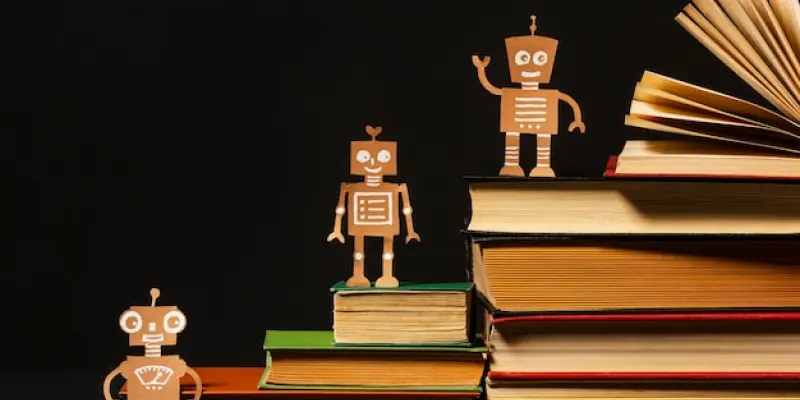By 2025, generative artificial intelligence (AI) has significantly revolutionized various sectors, from healthcare and gaming to finance and education. Its influence is expected to keep expanding exponentially, requiring enthusiasts, experts, and informed readers to stay abreast of the latest trends and developments. The pursuit of knowledge in generative AI demands understanding complex models and their applications, making it essential to turn to well-curated books that expertly break down these topics. As the global AI market is predicted to grow by $126 billion by 2030, reading the best generative AI books offers comprehensive insights into the technology’s theoretical and practical aspects. The books mentioned below are indispensable resources for anyone keen on diving deep into the realm of generative AI, each offering a unique perspective on the subject.
Exploring Deep Generative Models
“Generative Deep Learning, 2nd Edition” by David Foster stands out as a comprehensive guide that offers practical coding examples tailored for both beginners and seasoned programmers. The book skillfully navigates through deep generative models, explaining their structure and functioning in a manner that promotes hands-on learning. As generative AI relies heavily on deep learning frameworks, this book makes it accessible by breaking down complex mathematical concepts into understandable segments. It encourages readers to experiment with code, fostering a deeper understanding through practice. Foster’s updated edition ensures that the content remains relevant, adapting to the latest advancements in the industry. For programmers aiming to enhance their generative AI skills, this book is a vital resource that bridges the gap between theory and practice.
Another indispensable read in this category is “Reinforcement Learning and Artificial Intelligence” by Richard S. Sutton and Andrew G. Barto, which delves into the synergy between reinforcement learning and generative AI. The book provides a robust foundation in the theory and practice of reinforcement learning techniques, offering readers the tools they need to understand how generative AI models can be trained to make autonomous decisions. Both academic and professional audiences will find value in the comprehensive content, which covers a wide range of applications from gaming to robotics. Sutton and Barto’s work integrates theoretical insights with practical applications, making it a valuable asset for anyone looking to explore the intersection of reinforcement learning and generative AI.
Ethical and Social Implications
In an era where AI continues to evolve rapidly, understanding the ethical and social implications of generative AI is crucial. Brian Christian’s “The Alignment Problem” provides a profound examination of these issues, particularly focusing on how AI, inclusive of generative models, aligns with human values and ethics. The book delves into real-world scenarios and philosophical debates, offering readers a well-rounded perspective on the challenges and potentials of AI. Christian’s investigative approach makes this book a must-read for policymakers, researchers, and anyone concerned with the broader impact of AI technologies on society. By addressing both the technical details and the ethical ramifications, it stimulates critical thinking about how to responsibly develop and implement AI systems.
“AI 2041: Ten Visions for Our Future” by Kai-Fu Lee and Chen Qiufan presents a unique fusion of fiction and non-fiction to explore the future impact of AI on our daily lives. This book envisions the world in 2041, depicting various scenarios where AI plays a central role in transforming industries and societies. Through a blend of storytelling and technical insights, Lee and Qiufan paint a vivid picture of the potential benefits and drawbacks of AI advancements. This imaginative approach makes complex concepts more relatable and helps readers grasp the profound implications of generative AI. For those interested in futuristic outlooks on AI’s evolution, “AI 2041” provides a compelling narrative that bridges speculative fiction with scientific foresight.
Language Models and GPT Evolution
“Transformers for Natural Language Processing” by Denis Rothman offers readers a deep dive into the mechanics of GPT (Generative Pre-trained Transformers) and their evolution. Covering the fundamentals of transformer architecture, this book provides practical coding examples and detailed explanations of how GPT models work. Rothman’s expertise ensures that readers understand the nuances of language models and their applications in various fields, from chatbots to content generation. The book is a valuable resource for those looking to gain a solid foundation in the latest advancements in language models and their practical uses in generative AI.

